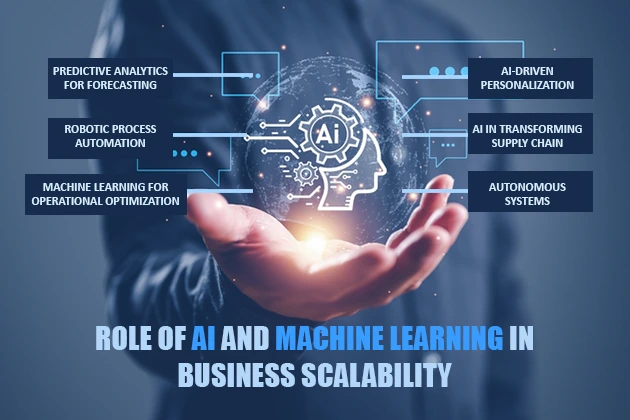Modern businesses in this digital era are writing new stories, leaving a legacy of inspiration, innovation, and tech-driven operations for generations of enterprises to follow. Leading through the continuously evolving business landscape requires high scalability, adaptability, agility, and resilience. Artificial intelligence (AI), as the most revolutionary change driver in the post-pandemic era, is helping businesses achieve scalability. This write-up explores how artificial intelligence is transforming C-suite operations to ensure business scalability.
What are C-Suite Operations and the Purposes They Hold?
C-suite operations are executed to ensure scalability, agility, and innovation in businesses. The highest-level executives in a company are responsible for determining strategic direction and overseeing major operations. C-suite executives include roles like the Chief Executive Officer (CEO), Chief Financial Officer (CFO), and Chief Operating Officer (COO). It usually encompasses all executives who run an organization. They work together to align daily operations with organizational goals, ensure profitability, sustainability, and success, and manage finances effectively.
CEOs carry out multiple tasks with the help of other members, but they are the ones responsible for a company’s success and failure. As industries continue to evolve with technological advancements, the CEO’s job becomes bigger and harder. CFOs are responsible for managing a company’s finances. They also manage financial risks related to physical assets, strategy, cash, credit, and more. COOs ensure that the company is delivering its products and services successfully to the market. They navigate employees through production, service delivery, customer services, and other operations to make sure all are executed well.
Apart from these roles, C-suite executives also include the roles of CTO (Chief Technology Officer), CMO (Chief Marketing Officer), and others. C-suite operations include business administration, recruitment, staffing, and strategy making. Challenges like digital transformation, evolving future trends, and supply chain disruptions often make the jobs of C-level executives arduous.
By leveraging advanced technologies like AI, they are embedding innovation into organizational operations. C-level executives at the forefront of C-suite operations are leveraging this phenomenal technology and ML to transform their operations and scale their businesses. Let’s find out how.
Artificial Intelligence in Transforming C-Suite Operations
Artificial intelligence has radically transformed strategic decision-making in the C-suite. The continued evolution of this technology and its integration into business models is profound. It offers executives powerful tools to enhance their decision-making processes. Let’s find out how AI-powered tools are changing the course of C-suite operations across businesses.
Predictive Analytics for Forecasting
Using statistical algorithms and machine learning techniques, predictive analytics help C-suite executives identify the likelihood of future outcomes depending on historical data. Predictive analytics can forecast market trends, potential risks, and customer behavior for executives. This enables proactive decision-making, helping companies stay ahead of market competition.
Natural Language Processing (NLP) to Assess Consumer Behavior
NLP allows machines to interpret human language. C-suite executives can use NLP to analyze customer feedback, automate routine tasks, and monitor social media sentiment. This helps them learn about consumer preferences and market trends.
Robotic Process Automation for Task Automation
Robotic Process Automation is another AI-powered tool that automates routine and repetitive tasks. This can streamline operations, improve productivity and accuracy, and reduce operational costs.
Machine Learning for Operational Optimization
Machine Learning (ML) algorithms can learn from historical data. It can enhance customer experience, drive innovation, and optimize operations.
Impact of AI technologies on Business Models
The continued evolution of AI is giving birth to new technologies that can significantly influence business models. Below are some emerging AI-powered technologies that are impacting business models for C-executives.
Autonomous Systems
Autonomous systems like self-driving drones and cars are becoming extremely prevalent nowadays. These systems enhance logistics, reduce operational costs, and improve the delivery timing of goods. C-executives can integrate these autonomous systems into their business models to stay competitive.
AI-Driven Personalization
By leveraging advanced algorithms to deliver personalized customer experiences, C-suite executives increase customer satisfaction and loyalty. Through this feature of the AI technology, companies can stand out from the crowd.
AI is Transforming Supply Chain Management
AI can transform supply chain management by enhancing forecasting accuracy, logistics, and inventory levels optimization. This enables C-level executives to streamline supply chain operations.
AI in Cybersecurity
As the number of cyber threats continues to increase, C-suite executives are prioritizing AI to strengthen their cybersecurity measures. AI-powered cybersecurity tools can detect and respond to cyber threats, ensuring a robust defense system against cyber attacks.
The Role of ML in Driving Business Scalability
Modern-day C-suite executives are leveraging AI and machine learning for business scalability(https://theceoviews.com/how-ai-is-transforming-global-manufacturing-industry/). Business scalability refers to a company’s ability to handle growth and increased customer demand without an increase in costs or a drop in performance. It would be interesting to know how ML, a subset of AI, is contributing to the scalability of any business. Find out below.
From Data-Driven Decision Making to Scalability for Future Growth
Advances in machine learning are revolutionizing how businesses operate, unlocking fresh possibilities for efficiency and innovation. From streamlining routine tasks to empowering leaders with sharp, data-driven insights, ML adapts and grows alongside the business itself. As companies expand and data piles up, ML stands ready to sift through vast information, turning it into actionable strategies. With these intelligent solutions, businesses can make smarter choices, automate with confidence, and stay ahead of threats by swiftly detecting fraud. ML even helps executives anticipate customer needs, ensuring their offerings hit the mark every time.
The CEO Views is making its own position in the business publication industry, ensuring its content reaches a wider audience globally. We, at The CEO Views, aim to make a difference by helping industry peers connect through our features and coverage. By shedding light on varied industries, business topics, technologies, and more, it contributes to business research.










